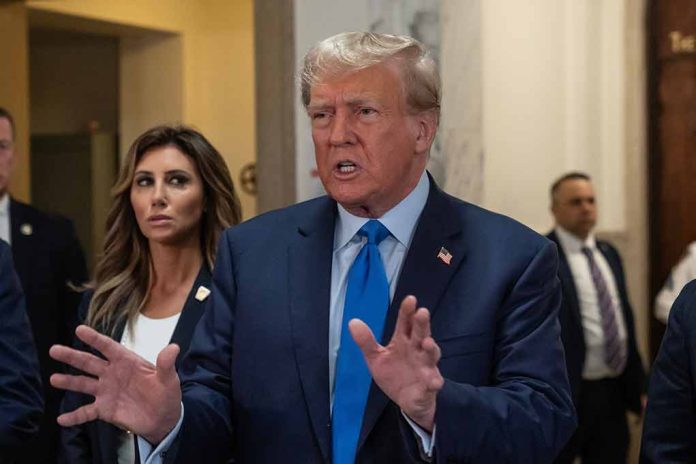
As President Trump escalates tariffs against China beyond 100 percent, a bipartisan Senate coalition challenges his authority while markets contract and Republican lawmakers find themselves caught between party loyalty and economic concerns.
Key Takeaways
- A bipartisan bill introduced by Senators Maria Cantwell (D-WA) and Chuck Grassley (R-IA) would require Congressional approval for presidential tariffs, with seven Republican senators backing the measure
- President Trump has threatened to veto the legislation, creating tension within Republican ranks as markets react negatively to escalating trade tensions
- The proposed legislation would require the president to notify Congress of tariffs within 48 hours and obtain approval within 60 days
- Democrats argue tariffs are an “economic nightmare” affecting agriculture, manufacturing, and small businesses while some Republicans remain supportive of the president’s trade strategy
Bipartisan Challenge to Presidential Tariff Authority
A significant challenge to President Trump’s tariff policies has emerged from an unlikely coalition in the Senate. Senator Maria Cantwell (D-Washington) and Senator Chuck Grassley (R-Iowa) have introduced bipartisan legislation requiring Congressional approval for presidential tariffs. The bill would mandate that the president notify Congress within 48 hours of imposing tariffs, with lawmakers then having 60 days to approve the action. This represents one of the most substantial legislative challenges to Trump’s trade authority since his return to office, with seven Republican senators already supporting the measure.
President Trump has made his position clear, threatening to veto the legislation if it reaches his desk. The bill’s prospects in the Republican-controlled House remain uncertain, highlighting the complex political dynamics at play. The timing of this legislative pushback coincides with Trump’s aggressive escalation of tariffs against Chinese imports, which have now surpassed the 100 percent threshold for certain categories of goods. This has created a significant rift among Republicans who are traditionally advocates for free trade but remain loyal to the president’s economic agenda.
You never did hear anyone from the Trump Administration offer help to earthquake victim. Unlike the TRADITIONAL AMERICAN 🇺🇸 LEADERSHIP? 🤔
“Tariffs will fall heavily on some of the world’s poorest countries, with nations in south-east Asia, including Myanmar, among the most… https://t.co/xwm5dB40gw
— Darius Mitchell_ Hip-Hop Republicans 2025🇺🇸 (@LowellCouncilor) April 3, 2025
Market Reaction and Economic Concerns
Financial markets have responded with volatility to the intensifying trade war, erasing significant gains made in recent months. The uncertainty has been compounded by conflicting messages within the Trump administration. Treasury Secretary Scott Bessent has advocated for a more measured approach to trade negotiations, while trade adviser Peter Navarro continues to champion aggressive tariff strategies. This internal discord has further unsettled investors, leading to market contractions that have alarmed both Wall Street and Main Street.
Republican senators find themselves in an increasingly difficult position. While many remain publicly supportive of the president, concerns about the economic impact of tariffs on their constituents are mounting. Agriculture, manufacturing, and small businesses are reporting significant cost increases, which are beginning to translate into higher prices for consumers. The dilemma for Republican lawmakers is whether to voice these concerns publicly or to continue supporting Trump’s trade strategy despite the economic turbulence it has created.
Constitutional Questions and Political Strategy
The legislative challenge to Trump’s tariff authority raises fundamental constitutional questions about the separation of powers. Senator Cantwell has emphasized that Congress must reassert its constitutional authority over trade matters. Parallel to the Cantwell-Grassley bill, Senator Ron Wyden (D-Oregon) is introducing a resolution to force a vote on the emergency declaration under which Trump instituted global tariffs. This two-pronged approach represents a significant attempt to rebalance trade policy authority between the executive and legislative branches.
“We are the conduit to those constituents. Those sectors of the economy, like agriculture or manufacturing or small business who are being hurt,” said Cantwell.
Cantwell has specifically challenged Trump’s core assertion that tariffs are necessary to address the trade deficit. She advocates for alternative strategies, including coalition-building with other countries to counter China’s trade practices, promoting innovation, developing a skilled workforce, and maintaining open markets. These approaches, she argues, would enhance U.S. economic leadership and job creation without the economic disruption caused by tariffs. As the debate continues, the outcome will likely shape not only U.S. trade policy but also the balance of power between Congress and the presidency on economic matters for years to come.
Sources:
- Farm-state Republicans rocked by tariffs fear Trump lacks exit strategy
- Sen. Maria Cantwell says there is bipartisan support to rein Trump’s tariffs
- GOP mood grows darker on Trump tariffs as markets give up their gains














